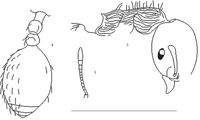Tetramorium kulickae
| †Tetramorium kulickae Temporal range: Priabonian, Late Eocene Baltic amber, Baltic Sea region | |
|---|---|

| |
| Scientific classification | |
| Kingdom: | Animalia |
| Phylum: | Arthropoda |
| Class: | Insecta |
| Order: | Hymenoptera |
| Family: | Formicidae |
| Subfamily: | Myrmicinae |
| Tribe: | Crematogastrini |
| Genus: | Tetramorium |
| Species: | †T. kulickae |
| Binomial name | |
| †Tetramorium kulickae Radchenko & Dlussky, 2015 | |
Identification
Distribution
This taxon was described from Baltic amber, Baltic Sea region, Europe (Priabonian, Late Eocene).
Castes
Nomenclature
The following information is derived from Barry Bolton's Online Catalogue of the Ants of the World.
- †kulickae. †Tetramorium kulickae Radchenko & Dlussky, 2015: 313, figs. 3-5 (w.) BALTIC AMBER.
Description
W o r k e r (fig. 3–5). Head longer than broad, with subparallel sides, very feebly concave occipital margin and rounded occipital corners. Lateral portions of clypeus raised in both sides into a sharp shield-like ridge in front of antennal insertions, so that antennal sockets separated from clypeal surface. Eye well developed, of moderate size. Anterior clypeal margin convex. Antenna 12-segmented, with 3-segmented apical club, scape short, far not reaching occipital margin. Mesosoma low (ML/MH 2.89), with distinct but shallow metanotal groove, promesonotum somewhat flattened. Propodeum with blunt denticles. Petiole with quite long peduncle, strongly concave anterior surface, its node not high, with widely rounded dorsum (PL/PW 1.17, PL/PH 1.40) Postpetiole subglobular (PPL/PPW 1.00). Spurs on the mid and hind tibia are obscure. Whole mesosoma with quite coarse longitudinal, slightly sinuous rugosity. Sculpture on head barely visible, but head seems to be longitudinally rugose; petiolar and postpetiolar nodes seem to be coarsely punctated. Mesosomal dorsum with long, thin erect hairs. Total length ca 2.5–2.7 mm. Measurements (in mm): ML 0.81, MH 0.28, PL 0.21, PH 0.15, PW 0.18, PPL 0.15, PPW 0.15. Queen and male unknown.
- E t y m o l o g y. Th e species is dedicated the memory of Polish palaeoentomologist, Dr. Róża Kulicka (1944–1999).